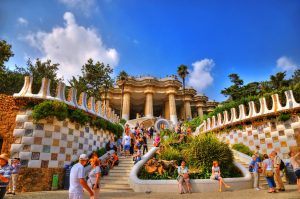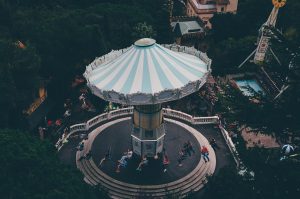The Gorgeous City Barcelona’s City on Spain’s northeastern coast is the lovely city of Barcelona. Catalonia, which is renowned for its unique language, customs, and culture, has this city as its capital. It is simple to understand why millions of tourists visit Barcelona each year—the city is lively and buzzing.
Barcelona People and Their Hotels
Barcelona and Their Hotels: The enormous basilica known as the Sagrada Familia, created by renowned architect Antoni Gaudi, is one of Barcelona’s most recognizable buildings. One of the world’s longest-running construction projects, church construction started in 1882 and is still going strong today. With its elaborate carvings, towering spires, and dazzling stained-glass windows, the Sagrada Familia is a magnificent sight even in its unfinished state.
Park Guell, another one of Gaudi’s masterpieces, is another well-known sight in Barcelona. The park is dotted with mosaics, sculptures, and other artistic elements, creating the impression of a vibrant, whimsical playground. It’s the ideal location for a leisurely stroll while taking in the breathtaking city views.
Modernist Architecture
Walking about Barcelona is one of the greatest ways to see the city. While the tree-lined boulevards of the Eixample neighborhood serve as a showcase for modernist architecture, the Gothic Quarter’s twisting, narrow lanes offer a fascinating maze of medieval architecture and hidden courtyards.
Whether you’re interested in art, architecture, food, or just taking in the colorful atmosphere of the city, Barcelona really has something to offer everyone. You will have priceless memories from this lovely and hospitable location.
The History of the Districts in Barcelona
Ten districts make up Barcelona, and each has a distinct history and set of features. This is a synopsis of the districts’ historical background; I will be dropping five now as the writing progresses, I will drop the other five districts.
Ciutat Vella
This is Barcelona’s oldest neighborhood and the city’s historic core. Four neighborhoods make up the area: El Born, Barri Gòtic, El Raval, and Barceloneta. In 1984, the districts of El Raval, Barri Gòtic, and Sant Pere, Santa Caterina i la Ribera were merged to establish the current district.
Les Corts
Les Corts is a western district of Barcelona that is well-known for its large shopping malls and sports facilities, including the Camp Nou stadium, home of FC Barcelona. It was formed in 1897.
Sants-Montjuïc
Sants-Montjuïc is a southern district of Barcelona that is known for its industrial heritage. It was formed in 1984 by combining the former districts of Sants and Montjuïc.

Eixample district
Eixample district is known for its grid-like pattern of streets and is home to many of Barcelona’s modernist buildings, including those designed by Antoni Gaudí. 1860 marked the district’s creation.
Sarrià-Sant Gervasi
This neighborhood, which is in the city’s north, is well-known for its affluent residential areas and upscale stores. The previous settlements of Sarrià and Sant Gervasi de Cassoles merged to form it in 1897.
Barcelona and Their Hotels
The city center of Barcelona, one of the most visited tourist sites in Europe, is a center of activity, culture, and history. As a result, the city center is full of hotels that suit a range of spending limits and tastes. Here are a few well-liked choices for travelers seeking lodging in Barcelona.
Hotel 1898: This opulent establishment has a rooftop patio with a pool and breathtaking city views. It is situated on the well-known La Rambla boulevard. The hotel has a restaurant, spa, and fitness center in addition to large, classically decorated rooms.
More Barcelona Hotels: Barcelona and Their Hotels
Hotel Colon Barcelona: This venerable establishment with excellent rooms overlooking the city or the cathedral is situated in the Gothic Quarter. The hotel has a restaurant with a Catalan menu, a fitness center, and a rooftop patio. H10 Cubik: Offering chic rooms with modern décor, this contemporary hotel is situated in the hip El Born neighborhood. The hotel has a restaurant that serves Mediterranean food, a fitness center, and a rooftop terrace with a pool.
The cozy rooms of the boutique hotel Olivia Plaza Hotel
which is centrally located and has views of Plaça Catalunya, are available. The hotel has a restaurant with a Mediterranean menu, a fitness center, and a rooftop patio.
Barcelona’s El Palace
This famous hotel has opulent rooms with traditional decor and is housed in a 19th-century edifice in the heart of the city. The hotel has a spa, a fitness center, a restaurant with a Catalan menu, and a rooftop patio.
Barcelona’s Social Life
Barcelona is a dynamic city with a thriving social scene that provides a multitude of cultural, entertainment, and leisure options. Barcelona’s most well-liked social events include going to concerts and festivals, touring art galleries and museums, dining at neighborhood eateries, and hanging out in parks and public areas with loved ones.
Social Life Priority: Barcelona and Their Hotels
Barcelona is a city that prioritizes work-life balance as well, as seen by the fact that many employees there have flexible schedules and ample vacation time. This can lead to a longer life expectancy and greater satisfaction by enabling residents to emphasize their personal well-being and have a happy social life.
Barcelona’s Museum and Cuisine
Barcelona is renowned for its top-notch museums, which include the Joan Miro Foundation and the Picasso Museum. Any art enthusiast should visit these institutions, which are home to some of the most significant pieces of 20th-century art.
Barcelona is renowned for its culinary scene in addition to its art and architecture. There are many different types of restaurants in the city, ranging from hip fusion spots to those serving traditional Catalan food. Pan con tomate, patatas bravas, and paella are a some of the delicacies that visitors to Barcelona simply must sample.
Concluding Parts of The Districts History
Gracia District
Numerous intellectuals and artists reside in this neighborhood, which is well-known for its bohemian atmosphere. The old villages of Gràcia, Vallcarca, and Penitents merged to form it in 1897.
Horta-Guinardó
Situated in the northeastern section of the city, this region is well-known for its parks, one of which is the Parc del Laberint d’Horta. Horta and Guinardó, two former villages, merged to become it in 1897.
Nou Barris
This neighborhood, which is in the city’s north, is well-known for its expansive housing developments. The settlements of Vilapicina i la Torre Llobeta, Roquetes, and Trinitat Nova merged to become it in 1984.

Saint Andreu
Situated in the northeastern region of the city, this district is renowned for its charming small-town atmosphere and historic core. The old communities of Sant Andreu de Palomar, La Sagrera, and Sant Andreu de la Barca merged to become it in 1897.
Saint Martí
This neighborhood, which is in the city’s east, is well-known for its beaches, which include the well-liked Barceloneta beach. The settlements of Sant Martí de Provençals, Clot, Poblenou, and Camp de l’Arpa merged to form this new village in 1897.
Conclusion
The charming city of Barcelona is located on the northeastern coast of Spain. As the capital of Catalonia, it is a region known for its distinct languages, culture, and customs. The Sagrada Familia, an enormous basilica designed by the renowned architect Antoni Gaudi, is one of Barcelona’s most iconic structures. The chapel is one of the longest-running construction projects in the world; it began in 1882 and is still ongoing today.
